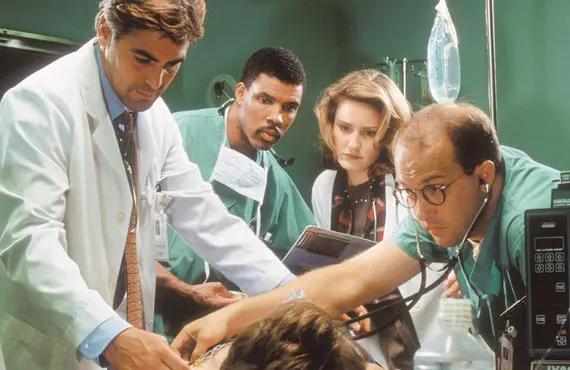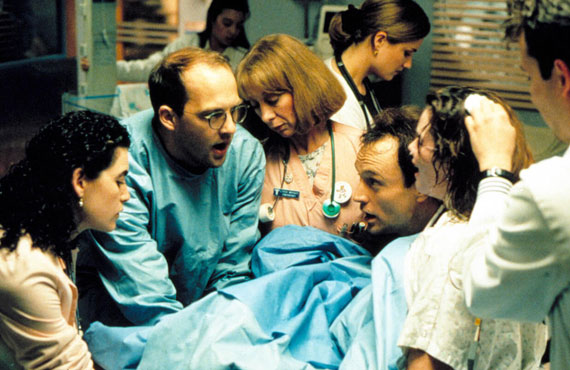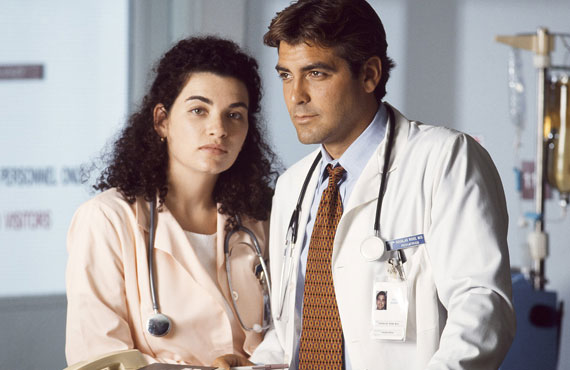Revisiting the ER Pilot: The Series Opener Still Stands Up
-
 George Clooney, Eriq LaSalle, Sherry Stringfield, Anthony Edwards in ER. (Warner Bros.)
George Clooney, Eriq LaSalle, Sherry Stringfield, Anthony Edwards in ER. (Warner Bros.)Everything good has to start somewhere, and for beloved TV shows, that usually means the pilot episode. Often written and filmed long before the rest of the series, and subject to tinkering by networks and creators before the show can continue, the TV pilot is a fascinating creature. In this recurring feature at Primetimer, we look back at the first episodes of some of the most culturally sticky TV shows in recent memory and see how their initial offerings hold up.
ER's hugely successful run didn't come as a surprise. This was not a little show that could, or an under-the-radar series that picked up steam as the American public gradually latched onto it. ER was the biggest new thing going into the 1994 fall TV season, and the only reason another show was even mentioned in the same breath was because the entertainment media tried to set up a rivalry narrative with CBS's Chicago Hope. Produced by Steven Spielberg from a script written by Michael Crichton, the show arrived just a year after Jurassic Park chewed up the box office, thus at the absolute height of Crichton's powers in American popular culture. While the ER pilot was viewed with some skepticism by the networks in its script stages, NBC eventually signed on and the network got behind the show in a big way once it saw what it had on its hands. The two-hour pilot episode aired on Monday night, September 19, 1994, back when "Monday Night at the Movies" was still a thing on NBC. Bestowed with the kind of fanfare that the network premiere of a major motion picture would get at the time, NBC premiered the pilot to huge public reaction, then aired the second episode three days later in the 10 PM Thursday timeslot that would be ER's domain for the next 15 years.
Revisiting the ER pilot all these years later, we expected to spot the kind of imperfections and stray hairs that pop up in all pilots, especially those from the mid-'90s, which tend to feel outdated in any number of ways. But the ER pilot is perhaps even more impressive today than it was back then. Not only does the show's entire universe appear fully formed from the very first minute — including well-drawn characters and conflicts that will branch out into the first season and beyond — but its look and feel is on point from the first moment. The urgency of the cameras moving through the intricate emergency-room set, the hectic pace as the doctors move from case to case, the struggles between the doctors' dedication to the job and trying not to live and die with each case... the episode sets up everything that ER would be about, and it does so in riveting fashion.

THE SHOW: ER
THE EPISODE: "24 Hours"
AIR DATE: September 19, 1994The Plot
As the episode title suggests, the pilot covers 24 hours at Chicago's County General Hospital, following Dr. Mark Greene (Anthony Edwards) from his 6:30 AM wake-up call on day one all the way through to his 6:30 AM wake-up call the following day. From there, things move rapidly, cycling through more than a dozen patients with a range of medical conditions that include nearly-severed limbs, heart attacks, minor burns, aneurysms, ectopic pregnancies, lung cancer, and more. No single patient stands out as more important than the rest — rather it's the sheer volume and unrelenting nature of the work that takes center stage — that is, until nurse Carol Hathaway (Julianna Margulies) is brought in after a seemingly intentional drug overdose shortly after her shift has ended. Yet even with Hathaway's crisis taking a personal toll on the ER staff, the doctors, nurses, and staff press on during this fairly typical life-or-death day.
Show Thesis on Display
There are a few big ideas that the ER pilot gravitates toward. One is the overwhelming nature of the job, which is made clearest through the character of John Carter (Noah Wylie), who's experiencing his first day as an intern and spends most of it stitching up cuts, inspiring zero confidence along the way. Another is the familiar trope of doctors putting their personal lives aside as they deal with the pressing demands of their jobs. Greene's marriage is already visibly straining under the weight of this, a storyline that will progress as the season goes on. At one point, in a scene that was used heavily in the show's promotional campaign, Dr. Susan Lewis (Sherry Stringfield) is asked if she has a boyfriend and she replies, "No, I'm a doctor."
Rough Edges
Not much to report here. Earning the "Coco award" in the E.R. pilot is Holly Gagnier as Dr. Tracy Young — an intern working with Dr. Doug Ross (George Clooney) — who is initially disillusioned by his behavior, but who warms to him as she sees him in action. You expect this character to become more important as the series goes on, but she's never seen again. Somewhat similarly, Glenn Plummer plays the most prominent of the ER desk clerks, and while his character recurs for a bit in the early years and then comes back in later seasons, other desk clerks like Jerry (Abraham Benrubi, also in the pilot) were ultimately featured more prominently. But when that's all you can find in terms of rough edges, you know the show's in really good shape.
There From the Jump
Almost all of the most prominent characters are fully formed from the break, and in an impressive feat of scripting, they each get a moment or two in the pilot where another character neatly sums up who they are in a sentence or two, without it feeling overly pilot-y. As the staff gets hit with the wallop of Nurse Hathaway's overdose, ER chief Dr. Morgenstern (William H. Macy, still a couple years out from his Fargo Oscar-nomination) reminds Dr. Greene, "You set the tone, Mark," which is of course exactly what his character does throughout the episode. Earlier, Dr. Morgenstern tells Carter to take guidance from the cocky but brilliant Dr. Peter Benton (Eriq LaSalle): "Learn from everything he does. Except his attitude."
And then there's George Clooney as Dr. Ross, pediatrician and flirt, who's introduced to the audience stumbling into the ER from a night of carousing, with Greene needing to hook him up to an IV to pump him up. Dealing with children as he does, Ross gets plenty of chances to look dreamy while being nice and heroic for the most helpless of patients, but nurse Haleh (Yvette Freeman) has his number and isn't afraid to say so. When Dr. Young notes "He's handsome," Haleh immediately replies, "He knows it."

Dropped Entirely
The biggest change from the pilot to the rest of the series is that, famously, Carol Hathaway wasn't originally meant to survive her overdose. The episode actually leaves her character in limbo (not literally or ecclesiastically), not saying whether she'll pull through. But of course she does and goes on to star for six more seasons before she and Ross are happily reunited in Seattle with Oscars and Emmys in their future.
Also, Dr. Lewis's "I'm not married, I'm a doctor" line seems to suggest the show will eschew personal stories to focus on the day-to-day medical stories, but as anyone who watched ER for any length of time will tell you, that's very much not the case.
And in a fun little Easter egg, Troy Evans shows up as Frank, a short-fused cop whose wife may have shot him in an argument. We don't hear any more from him, but Frank will end up returning six years later as a desk clerk, staying on until the end of the series.
The Set(s)
The pilot was shot on location in the old Linda Vista Hospital in Los Angeles, before transferring to a set on the Warner Bros. lot for the rest of the series, which is a fairly typical practice for pilots that often results in noticeable differences between sets in episodes 1 and 2. But while the sets are different, the continuity between the pilot and the rest of the series is remarkably strong. The pilot's visual tone is so dynamic, with steadicam shots in and out of the different operating rooms in a manner that presages the celebrated West Wing pilot, which similarly won praise for the way its cameras tracked characters through the show's corridors and offices.
Where to Watch
All 15 seasons of ER are now streaming on Hulu
People are talking about ER in our forums. Join the conversation.
Joe Reid is the senior writer at Primetimer and co-host of the This Had Oscar Buzz podcast. His work has appeared in Decider, NPR, HuffPost, The Atlantic, Slate, Polygon, Vanity Fair, Vulture, The A.V. Club and more.
TOPICS: E.R., Anthony Edwards, Eriq La Salle, George Clooney, Julianna Margulies, Sherry Stringfield, William H. Macy
- Mary Mara, ER and Criminal Minds Actor, Dies of Possible Drowning at 61
- John Aylward, The West Wing and ER Actor, Dies at 75
- Fred Ward, character actor with roles on ER, Grey's Anatomy and True Detective, dies at 79
- Anthony Edwards and Mare Winningham privately eloped last year, two decades after appearing together on ER